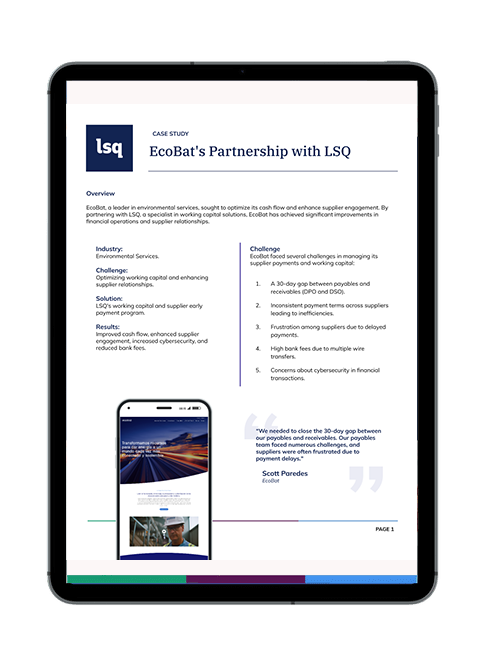Author
Andy Cagle
Share
In 2019, Stu Burgh and his team at QualDoc made the strategic decision to add contingent staffing to their burgeoning supply chain consulting and remote documentation review business. And while the company was fortunate to have investors and serve industries requiring high-wage skilled workers, the explosive growth of the staffing side of QualDoc’s business presented a number of working capital challenges.

“We quickly got to the point where we were having issues keeping up with growing payroll as we added more and more contingent workers and adding clients who needed those workers,” said Burgh. “We knew we needed help.”
The Challenge
According to Burgh, many of their clients were pushing out payment terms, sometimes to 180 days. For a young company like QualDoc, this situation was untenable.
“For the last eight years, pushing payment terms longer has been one of sourcing’s main objectives in most large companies,” said Burgh.
But Burgh had to make payroll every week, regardless of when QualDoc received payment.
“What it does is it pushes out any small company,” he said. “And so, you drive out competitiveness, you drive out innovation and you drive out small players that are willing to take a smaller margin to get the business. You end up with large companies taking advantage of smaller staffing firms that just don’t have the operating capital needed to survive with these insane payment terms.
“If you want the business, you have to front the six months of payroll to get started. On top of that, if you want to grow in the program, you’re basically lagging that six months the entire time you’re trying to grow.”
As the business expanded, Burgh knew the problem was only going to get worse.
“I had a pipeline full of sales. I looked at it and concluded, ‘wait a minute, if I continue to grow at 20 percent a month into perpetuity, I would never make any money.’”
Exploring the Options
QualDoc explored solutions, but for myriad reasons, couldn’t find a solution that worked for their business.
“We had actually been down the path of looking at lines of credit or other financing options,” said Burgh. We talked to a number of companies, but we couldn’t find anybody that really had a rate that we liked. And on top of that, we had to put on a personal guarantee and the fact that we’re a new company, a new small company, it was just really an uphill battle.”
That’s when Burgh got connected with Qwil Powered by LSQ.
The Qwil Solution
Qwil provides payment options for contingent workforce suppliers as soon as their invoices are approved, regardless of net billing terms. The early-payment solution integrates directly with SAP Fieldglass and is available for staffing suppliers in TAPFIN programs. Staffing suppliers who choose to enroll with Qwil continue to work in the program with TAPFIN as usual but are paid by Qwil, which provides an early-payment opportunity on an invoice-by-invoice basis. Suppliers elect to take all, some, or none of the offered early payment. They have flexibility to take funds at any point up until the amount is paid by the client per the usual contract terms. TAPFIN and Qwil worked closely to ensure utmost flexibility of the program and there is no cost to the supplier to enroll.
“What really had a lot of appeal to us with Qwil besides the rate and the ease of use, which is just tremendous, was the fact that it’s backed by TAPFIN, not by us,” said Burgh. “For a new small business like us, personal guarantees can be scary. So to be able to forgo that and not go through an extensive onboarding process or have to have liens was important to us.”
According to Qwil Founder Johnny Reinsch, the partnerships built by Qwil provide them with the assurances they need to back these types of programs and staffing suppliers.
“We know, based on our use of SAP Fieldglass, our relationship with TAPFIN, and the clients’ payment history, that they’re very likely to pay,” Reinsch said, “We’re so convinced about that, we don’t need crazy credit hooks.”
Another important part of the Qwil solution for Burgh is the auto advance feature in the platform. With auto-advance, QualDoc’s payments are automatically sent to their account when invoices are consolidated.
“The auto pay is great for us because we don’t have to worry about requesting payment or doing any manual process,” he said. “We just know that when the invoices are approved, we will receive the money.
“It really does help with cash forecasting and payment certainty.”
Results
“Qwil really allowed us to grow really much faster than we would’ve even tried to grow previously,” Burgh summarized.
According to Burgh, QualDoc is placing five-to-10 highly-skilled contingent workers (machinists, welders, machine operators, etc.) – from a pool of more than 50 people under contract – with their seven large industrial clients. The numbers represent explosive growth (20 percent month over month) considering they have only been in the contingent staffing business since October 2021.
Editor’s Note: Qwil was recently acquired by LSQ, a leading provider of working capital finance and payments solutions. By leveraging Qwil’s deep proprietary embedded finance integrations and LSQ’s existing experience in serving contingent staffing and professional services firms, and credit and risk management, both entities are now able to serve more – and provide more comprehensive solutions to – clients.
Stay in the loop




![LSQ-merger_Logo_Stacked_white[84]](https://www.lsq.com/wp-content/uploads/2025/02/LSQ-merger_Logo_Stacked_white84-200x97.png)
